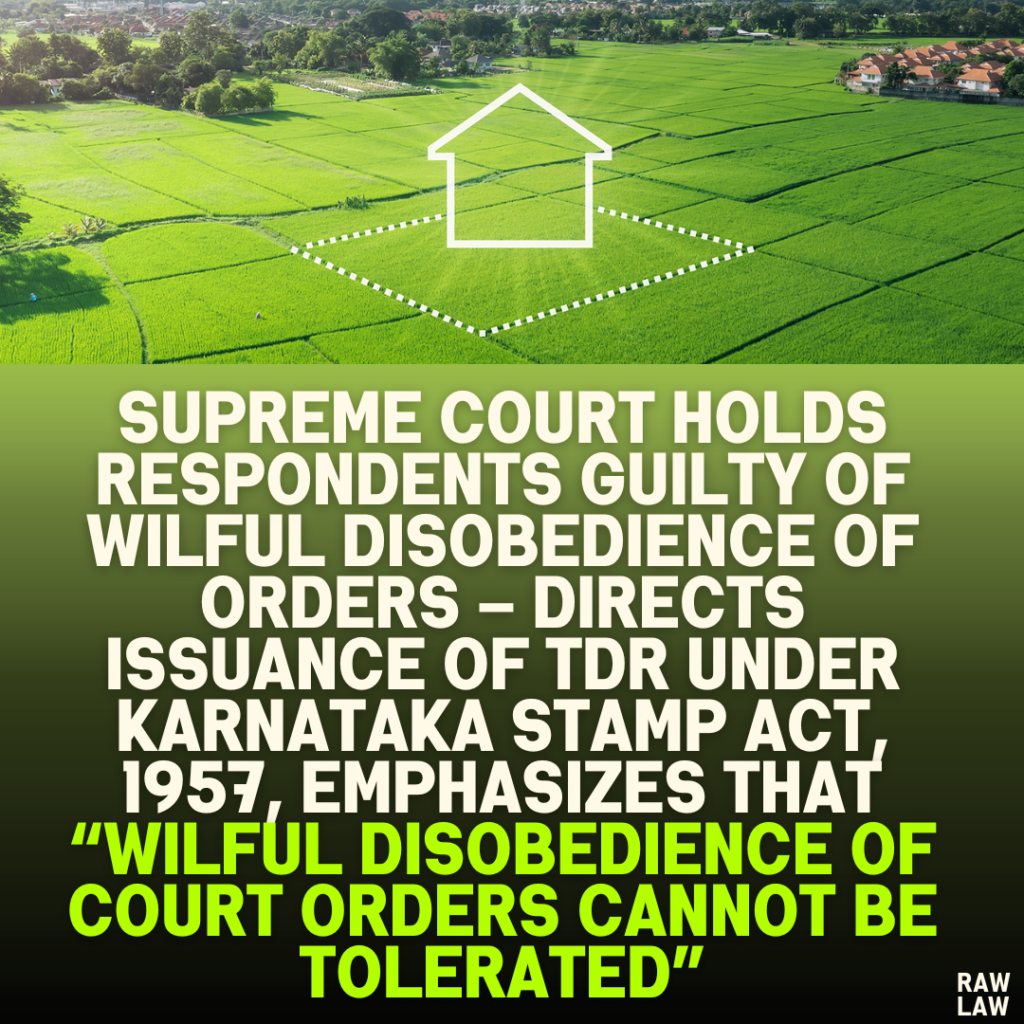Court’s Decision:
The Supreme Court held that the respondents wilfully disobeyed its orders dated 21.11.2014, 17.05.2022, and 19.03.2024, which directed them to issue Transferable Development Rights (TDR) certificates in compliance with the Karnataka Town and Country Planning Rules, 2016. The Court ordered the issuance of TDR certificates within six weeks based on the guidance value fixed under Section 45B of the Karnataka Stamp Act, 1957. The issuance of TDRs was made subject to the outcome of pending civil appeals, ensuring sufficient safeguards for both parties.
Facts:
- Background of the Dispute:
- The land in question (15 acres and 39 guntas) was part of the Bangalore Palace grounds, owned by the erstwhile Maharaja of Mysore.
- The land was acquired for widening Bellary and Jayamahal Roads by the State of Karnataka.
- In 2014, the Supreme Court permitted road widening on the condition that TDR would be issued to the landowners as per the TDR Rules.
- Previous Orders:
- 21.11.2014: The Court allowed road widening, directing the issuance of TDR as per the Karnataka Town and Country Planning Rules, 2016.
- 17.05.2022: The Court reiterated its earlier order, dismissing the State’s plea for modification of the 2014 order, which sought compensation instead of TDR.
- 19.03.2024: The Court extended a final deadline of eight weeks for compliance but added a condition requiring TDR recipients to undertake to return any benefits if civil appeals went against them.
- Non-Compliance:
- The respondents failed to issue TDR certificates, citing financial hardships, administrative delays, and disputes over market valuation of the land.
- Instead of adhering to the guidance value prescribed under the Karnataka Stamp Act, they used an arbitrary valuation of the land.
Issues:
- Wilful Disobedience:
- Did the respondents wilfully disobey the Supreme Court’s orders?
- Compliance with TDR Rules:
- Were the TDR certificates issued in compliance with the Karnataka Town and Country Planning Rules, 2016, particularly with respect to the valuation of the land?
Petitioner’s Arguments:
- The respondents failed to comply with the explicit directions of the Supreme Court, violating its dignity and authority.
- The valuation adopted by the respondents for TDR issuance was inconsistent with the guidance value under the Karnataka Stamp Act.
- Deliberate delays, suppression of facts, and inconsistent positions taken by the respondents were highlighted.
Respondent’s Arguments:
- Compliance efforts were made, including issuing notices to the petitioners and preparing for TDR issuance.
- Delays occurred due to administrative and financial hurdles.
- They apologized unconditionally for any perceived lapses and sought the dismissal of contempt petitions.
Analysis of the Law:
- Wilful Disobedience:
- The Court reiterated that wilful disobedience implies deliberate, conscious actions contrary to its orders. Negligence or ambiguity does not qualify.
- The respondents’ actions—consistent delays, arbitrary valuations, and attempts to modify the original order—amounted to wilful disobedience.
- TDR Rules Compliance:
- The Karnataka Town and Country Planning Rules require the market value for TDR issuance to be based on guidance values under Section 45B of the Karnataka Stamp Act, 1957.
- The respondents arbitrarily reduced the valuation, treating the land as agricultural without substantiating the claim.
- Contempt Jurisdiction:
- The Court emphasized that contempt jurisdiction is limited to ensuring compliance with explicit directions in its orders, not for speculative interpretations.
Precedent Analysis:
- Sudhir Vasudeva v. George Ravishekeran (2014):
- Contempt jurisdiction must be confined to enforcing explicit directions of court orders.
- Rita Markanday v. Surjit Singh Arora (1996):
- Non-compliance with representations made to the court constitutes contempt.
- Ram Kishan v. Tarun Bajaj (2014):
- Deliberate non-compliance with court orders is a clear case of wilful disobedience.
Court’s Reasoning:
- Pattern of Delays:
- The respondents delayed compliance from 2014 to 2024, citing inconsistent reasons such as financial hardship and administrative hurdles.
- Attempts to modify the original order in 2021 were dismissed, yet no meaningful steps were taken for compliance.
- Arbitrary Valuation:
- Instead of using the guidance values under the Karnataka Stamp Act (₹2,83,500 per sq. meter for Bellary Road and ₹2,04,000 per sq. meter for Jayamahal Road), the respondents arbitrarily reduced the valuation to ₹120.68 per sq. meter.
- This valuation was contrary to the TDR Rules and earlier representations made by the State.
- Suppression of Facts:
- The respondents misrepresented facts about land possession and compliance efforts, creating a misleading narrative before the Court.
- Final Opportunity:
- The Court noted that while compliance had been partial, it fell short of the orders’ spirit. A final six-week deadline was granted for full compliance.
Conclusion:
The Supreme Court found the respondents guilty of contempt for wilful disobedience of its orders and directed:
- Issuance of TDR certificates based on the correct guidance value under the Karnataka Stamp Act.
- Compliance within six weeks.
- TDR issuance to be subject to final decisions in pending civil appeals.
The Court emphasized that financial hardships cannot override judicial directives, and deliberate non-compliance undermines the judiciary’s authority.
Implications:
- Judicial Authority: The ruling reinforces the binding nature of court orders and the consequences of non-compliance.
- Guidance Value Adherence: It clarifies the application of guidance values under the Karnataka Stamp Act for TDR issuance.
- Government Accountability: The judgment serves as a stern reminder to government authorities about their duty to promptly and faithfully implement judicial decisions.
